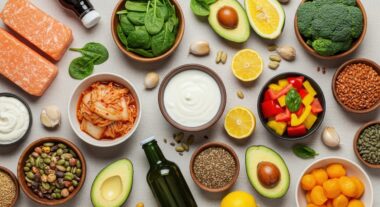How Antioxidants Help Reduce Inflammation Affecting Coordination
Antioxidants play a crucial role in reducing inflammation, which is essential for maintaining proper coordination and balance. Inflammation can hinder muscle strength and agility, leading to significant issues in everyday movements and physical activities. By incorporating antioxidant-rich foods into our diet, we become better equipped to combat oxidative stress that leads to inflammation. Foods such as berries, nuts, and leafy greens are exceptional sources of these beneficial compounds. These foods not only reduce inflammation but also support overall health. Additionally, antioxidants can enhance recovery after physical exertion, making them vital for individuals engaged in balanced training regimes. Consuming antioxidants can promote quicker healing and increase muscle coordination. This recovery aspect is especially important for athletes, as it allows them to practice consistently without prolonged downtime. A balanced diet rich in antioxidants could be the solution for optimizing performance. Therefore, it is advisable to identify ways to include these foods in meals. Consider preparing smoothies or salads packed with vibrant fruits and vegetables. By doing so, we can enjoy enhanced balance and coordination performance while nourishing our bodies effectively.
Incorporating nuts and seeds into your meals can also provide rich antioxidant benefits. They contain healthy fats and important vitamins that contribute to reducing inflammation. For example, walnuts and flaxseeds are particularly high in omega-3 fatty acids and antioxidants. Omega-3 fatty acids have been widely studied and found to positively affect joint health and function. Including these nutrient-rich foods in salads or snacks can easily boost antioxidant intake while supporting coordination improvement. Recipes can be simple; nut butter on whole grain toast or a trail mix with dried fruits can be advantageous. Additionally, turmeric, known for its anti-inflammatory properties, can prove beneficial for coordination. Curcumin, the active ingredient in turmeric, has shown strong antioxidant properties. Adding turmeric to your cooking can increase your antioxidant intake while enhancing flavor. Consider making a golden milk latte or a tasty curry enriched with turmeric. Regularly consuming these foods provides the body with the necessary tools to fight inflammation. It is advisable to make these dietary changes gradual, ensuring the body adjusts well to the new flavors and nutrients. Overall, a consistent intake of antioxidants shapes a healthier lifestyle which benefits balance and coordination.
Maintaining proper hydration is crucial in conjunction with a diet rich in antioxidants. Dehydration can lead to fatigue, muscle cramps, and decreased coordination. Therefore, adequate water intake should not be overlooked when focusing on nutrition for balance and coordination. To combine hydration with antioxidants, consider infusing water with fruits. Citrus fruits such as oranges or berries can greatly enhance the flavor of water while contributing essential vitamins and antioxidants. This practice not only promotes hydration but also adds nutrients beneficial for reducing inflammation. Drinking antioxidant-rich herbal teas can also be a delicious and healthy way to stay hydrated throughout the day. Alternatives like green tea and hibiscus tea are known for their high antioxidant concentrations. Regularly consuming these beverages can positively influence inflammation control. Aim to integrate these hydration tips alongside plenty of fluids. Remember, comprehensive hydration is vital for optimal coordination and balance. Maintaining a balance between fluid intake and nutrient-rich foods enables the body to function at its best. With proper hydration and nutrition, we can better support physical activities while minimizing the chances of injury. This holistic approach empowers individuals to enhance their overall coordination.
Recipe Ideas for Effective Nutrition
Integrating antioxidant-rich ingredients into daily recipes makes it easier to enjoy their benefits. Consider experimenting with rich, colorful ingredients in various meals to inspire creativity and healthfulness. A berry smoothie bowl can be a delightful breakfast option. Utilizing a variety of berries provides an extra burst of flavor and antioxidants. Additionally, topping it with seeds or nuts adds texture and healthy fats. A flavorful quinoa salad mixing roasted vegetables, nuts, and a lemon vinaigrette can serve as a nutritious lunch. This meal can ensure adequate antioxidant intake while also being satiating. Furthermore, cooking with vibrant herbs and spices promotes both taste and health. Incorporating garlic, ginger, and fresh herbs such as rosemary or thyme elevates meal integrity. As dinner approaches, experimenting with roasted vegetables seasoned with a variety of herbs presents additional antioxidant benefits. Aiming for a rainbow of colors on your plate signifies a variety of nutrients being consumed. Ensuring each meal is rich in antioxidants can transform not just taste but also overall wellness. These nutritional changes can significantly improve coordination and blood circulation contributing to overall fitness. Look to diversify meals with inventive recipes that offer optimal health.
It’s also important to consider the influence of antioxidants on brain health. Several studies have suggested that a diet rich in antioxidants may improve cognitive function, which directly relates to coordination. The brain plays a significant role in balance and body mechanics. Thus, including foods rich in flavonoids, such as citrus fruits and dark chocolate, can enhance neurological health. This connection emphasizes the importance of nutrient diversity in a balanced diet. Research indicates that flavonoids may improve memory and cognitive function while protecting against neurodegenerative diseases. Integrating these foods can not only boost coordination but also support overall brain health. Therefore, you might find it worthwhile to snack on blueberries in yogurt or enjoy a piece of dark chocolate. Incorporating these antioxidant-rich, brain-boosting foods into daily snacks can positively affect coordination through healthier brain functioning. The synergy of physical and cognitive aspects related to coordination showcases the need for a comprehensive dietary approach. Remember that a balanced diet directly affects both mental and physical performance. This connection highlights the importance of nutritional choices in creating a comprehensive health strategy.
In conclusion, understanding the benefits of antioxidants is crucial for improving balance and coordination. Reducing inflammation through diet not only aids physical performance but has extensive implications for daily life. Whether it’s opting for colorful fruits, nuts, or hydration strategies, these simple changes have a significant impact. Moreover, recognizing the connection between brain health and coordination emphasizes the need for a well-rounded approach to nutrition. The body’s ability to function well hinges on proper nourishment and hydration. Consequently, endeavoring to adopt these nutritional habits will promote enhanced coordination and a higher quality of life. It is essential to see nutrition not only as a matter of energy intake but also as a vital tool for health improvement. Individuals should strive to make gradual changes that align with their taste preferences and lifestyle. By focusing on whole, nutrient-dense foods and ensuring proper hydration, we can build a strong foundation for better health. The journey towards improved balance and coordination may begin with a simple scoop of berries or a handful of nuts. Taking these steps today lays the groundwork for a healthier, more agile future.
Lastly, keep in mind that making lifestyle changes takes time and consistency. Establishing a nutrition plan that includes antioxidants is not an overnight task. Therefore, it’s essential to remain patient and persistent in implementing these nutritional strategies. Monitoring your progress and listening to your body can provide helpful insights into how particular food choices affect your balance and coordination positively. Gradually integrate antioxidant-rich foods into your meals while cherishing the process of discovery about food and its nourishing qualities. Having fun in the kitchen can improve long-term adherence to these new healthy habits. Creativity in meal preparation often leads to increased enjoyment, which boosts motivation. As you learn more about nutrition and its impact on your body, you may feel inspired to make further positive changes. Moreover, seeking resources such as cookbooks, blogs, and online courses can augment your knowledge about incorporating these valuable foods. Consider consulting a nutritionist for personalized guidance tailored to your unique needs. Nutrition should be a lifelong journey where learning and growth take center stage. Every small step taken toward improved dietary choices contributes to better health overall.





